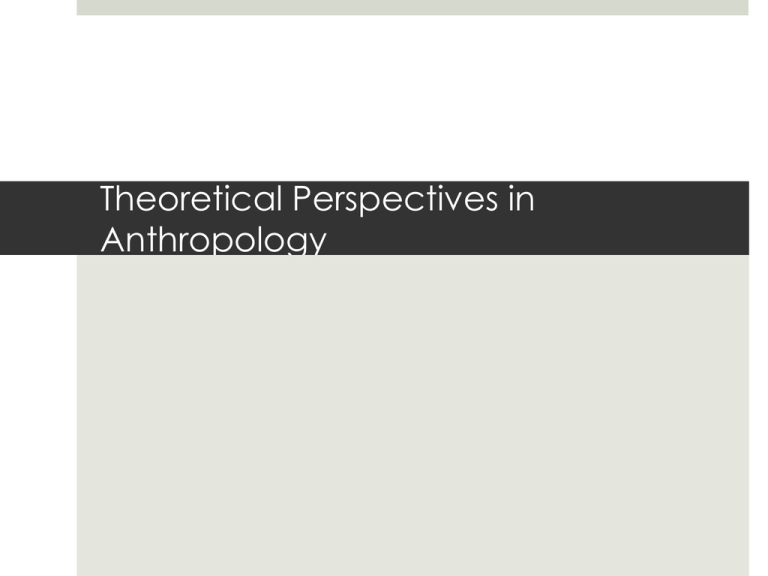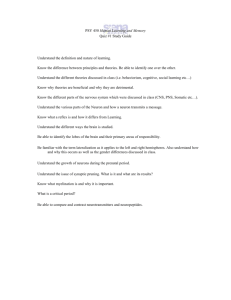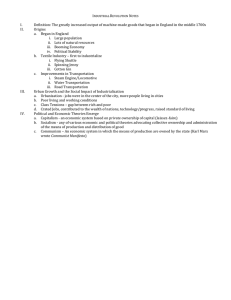Theoretical Perspectives in Anthropology
advertisement

Theoretical Perspectives in Anthropology Social & Cultural Organization Themes Themes should emphasize patterns and processes of change in society and culture and that anthropological knowledge changes over time. Individuals, Groups, and Society Every person is embedded in social structures and cultural dynamics that shape their identity and actions. The individual is committed to different groups simultaneously. Both the nature of the group and the individual’s commitment to it are dynamic and context dependent. The person’s actions may either reinforce or undermine these structures and dynamics. Anthropologists seek to understand these actions with reference to the structures in which the individual is embedded, even though the individual’s own understanding make no reference to these structures. This is often described as a tension between structure and agency Examples Socialization Status and role Gender and sexuality Personhood Conformity and nonconformity Public and private Social and group identity (ex; race and ethnicity, nationality, class, age, religious identity) Ritual (Ex; rites of passage) Social Movements (Ex; environmental movements, human rights, indigenous movements) Modernity Globalization Societies and Cultures in contact Societies have always interacted with one another and they define themselves, in significant ways, through these interactions. Examples Population movement (Ex; migration, forced removal, refugees) Ethnocide and genocide Indigenous movements Modernity Revitalization Tourism and travel Colonialism and post-colonialism Resistance Globalization Kinship as an organizing principal Kinship - basic unit of human social relations. It is structured in many different ways to define groups and the differences between them. Kinship groups are not static units but define fields of relationship and meaning through which economic and political processes occur. Examples Family and household Marriage Rights and property Rules of descent and residence Corporate descent groups Gender relations Migration Globalization Political Organization Political organization takes many forms, but all have the common element of ordering internal and external relations. Examples Power, authority, and leadership Formal and informal political systems (ex; egalitarian, rank, stratified, state, global) Social control and legal systems Inequality (Ex; class, caste, ethnicity, age, gender, health and illness) Social organization of space and place Status and role Conflict and resistance Ideology Nation building Colonialism and post-colonialism Social movements Globalization Economic Organization and the Environment Societies interact with and transform the environment in the production, allocation, and consumption of material and symbolic goods. Examples Division of labor Space and place Systems of production and consumption (Ex; subsistence, peasant, industrial, transnational) Scale (Ex; local, global) Environmental movements Social views of the environment Industrialization Urbanization Commodification Colonialism and post-colonialism Globalization Systems of Knowledge Systems of knowledge are ways of organizing and comprehending social and natural environments. Examples Symbolism Arts and expression Classification systems Relationships with the environment Interaction, media, and communication Belief Systems and Practices This element focuses on beliefs and ideologies, both sacred and secular. Examples Religion Religious movements Myths Rituals Witchcraft, magic, sorcery Conversion Moral Systems By enabling and constraining behavior, moral systems regulate the life of the individual in society. Examples Ethics Justice Taboos Suffering Good and evil Purity and impurity Honor and shame Globalization Theory In anthropology, a theory is an abstract framework that systematically organizes facts in order to make sense of the world. Agency-centered Agency - the capacity of human beings to act in meaningful ways that affect their own lives and those of others. Agency may be constrained by class, gender, religion, and social and cultural factors. This term implies that individuals have the capacity to create, change, and influence events. Anthropological research that emphasizes agency focuses on humans acting to promote their interests and the interests of the groups to which they belong (although what constitutes ‘interest’ may be subject to debate). Example of theories Feminist theories Marxist theories Political economy Resistance Transactional World Systems Cohesion-centered Some anthropologists see cohesion and consensus as central to the proper functioning of society and culture. Many anthropologists were influenced by Emile Durkheim Claimed that society could only function properly if its members experienced ‘solidarity,’ that is, a moral duty to work for the maintenance of society. Examples of theories Functionalism Structural Functionalism Conflict-centered Anthropologists who take conflict-centered perspectives focus on social relations as being based on competing interests of groups and individuals. Examples of theories Global theories Marxist theories Resistance Diachronic A diachronic perspective in anthropology seeks to understand society and culture as the product of development through time, shaped by many different forces, both internal and external. A diachronic perspective is generally historical, as illustrated by recent efforts to use historical methods and findings in anthropology. Examples of theories Ethnohistory Global theories Marxist theories Political economy World systems Idealist Idealist perspectives focus primarily on the activities and categories of the human mind (Ex; beliefs, symbols, rationality), and seek explanations for the human condition in terms of them. Examples of theories Cognitive theories Environmentalist theories Interpretivism Postmodernism Structuralism Symbolic theories Materialist Materialist perspectives in anthropology and other social sciences explain aspects if human existence in terms of their most tangible features (ex; technology, adaption to the environment, production and management of resources). Examples of theories Cultural ecology Cultural materialism Environmental theories Particularistic Anthropologists taking a particularistic perspective stress that aspects of society and culture must be understood in terms of their specific social and historical context. Example of theories Functionalism Historical particularism Postmodernism Structure-centered Structure-centered perspectives view social actions as determined by social and material context, such as physical environment, access to resources, community organization, social institutions, and the state. Examples of theories Cultural ecology Cultural materialism Functionalism Marxist theories Structural functionalism World systems Synchronic “Synchrony” refers to the occurrences of events at the same time, seeking to uncover the relationships between aspects of society and culture in the present or at a specific point in time. Examples of theories Functionalism Postmodernism Structural functionalism Universalistic Universalistic anthropological perspective seeks to discover underlying laws and principles common to all societies and cultures. Examples of theories Structuralism Structural Functionalism World Systems




